English : Term 2 Unit 1 : Prose : Adventures of Don Quixote
Warm up
My hand of imagination
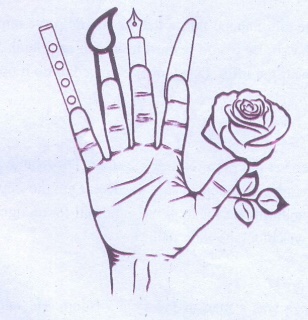
1. Trace around your hand on a white paper.
2. Make a list of your five choices.
3. Draw a picture to indicate what your finger would become.
4. Erase one finger at a time and draw your choice in its place.
5. Write and share in the class.
GLOSSARY
Knights – soldiers
incredible – unbelievable
hilarious– comical
ogres – giant
combat – fight
prodigious – large
steeds – horses
spurs – thing that prompts
Questions Answers
READ AND UNDERSTAND
Answer the following questions.
1. What kinds of books did Don Quixote like to read? What were these books like?
Don Quixote liked to read books about knights. These books were full of incredible adventures of courageous knights.
2. What effect do the things Don Quixote reads have on him?
Don Quixote became absorbed in those stories. He hardly remembered to eat or sleep.
3. Why didn’t Don Quixote believe Sancho Panza when Sancho told him the ogres were actually windmills?
Don Quixote thought that Sancho Panza was afraid of ogres. So he did not believe Sancho Panza when he told him that the ogres were actually windmills.
4. Why do you think Sancho continued to journey on with Don Quixote after the windmill incident?
Sancho Panza was loyal to Don Quixote. He wanted to protect his master from harm. Moreover, Don promised to give him an island. So Sancho Panza gave him timely warning and continued to travel with him.
5. When Don Quixote sees the cloud of dust on the plain in the distance, what does he think causes it?
Don Quixote thought that a prodigious army was marching in their direction. He thought that the cloud of dust was raised by the army.
6. Sancho sees two clouds of dust, leading him to conclude that there are two armies. What does Don Quixote think will happen next?
Don Quixote thinks that the two armies would close in on him.
7. What is the reaction of the shepherds when they see that Don Quixote is attacking their sheep?
The shepherds pelted stones on Don Quixote. Don was wounded and he fell to the ground.
Think and Do
1. Most people associate windmills with Holland, rather than Spain. Use the encyclopaedia and any other sources you might have to find out more about windmills and their traditional and modern uses. Then, make a model of a windmill to display with the results of your research.
2. Draw a design of a boat that skims trash off the surface of a river, lake, or ocean. Label the parts and give your invention a catchy name.
* What kind of vessel could do the job?
* What parts would it have?
* How would it move?
* How could it tell the difference between trash and other objects, such as animals and seaweed?
* How would it store and dump the trash?
* Could your machine double as a beach sweeper, sifting trash from sand?
Discuss and Answer
To Dream the Impossible Dream
Don Quixote might be seen as not simply crazy in his refusal to see things as they really are but more like a person who wants to accomplish a greater good and so refuses to compromise his ideals. Examples of such people include Nelson Mandela, Mahatma Gandhi, and Martin Luther King Jr.
Discuss (with examples and other evidence) whether or not they think Quixote deserves to be put in the company of real-world idealists or is merely delusional.
windmill
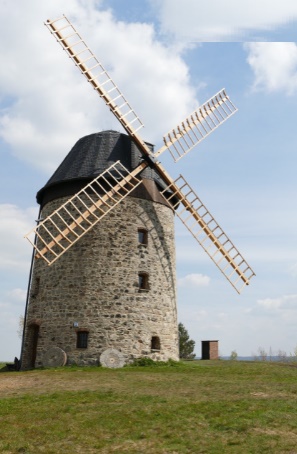
Holland is a land of windmills. These windmills make use of the power of wind. They have been used to pump water from low-lying areas and to grind corn. About a hundred and fifty years ago, there were thousands of windmills across the Netherlands. Many were used to drain water from low-lying land. Very few remain today. Windmills have sails which turn a shaft. This is connected by gear wheels and another shaft to a pump, a stone for grinding corn. Windmills are still used in many parts of the world for pumping water from wells and drainage ditches.
Vocabulary
Homophones are two words that are spelled differently but have the same sound.
A. Explain the difference between these words by making sentences. One is done for you.
1. see/sea – Can you see the birds flying over the sea?
2. knight/night – The knight went to sleep at night.
3. right/write – I shall write the right answer,
4. arms/alms – The man in arms gave alms to the beggar.
5. fair/fare – The fair young lady paid the fare for the journey,
6. here/hear – If you come here you can hear the noise,
7. heard/herd – I heard that a herd of elephants entered our field,
8. our/hour – I shall come to our office in an hour,
9. no/know – I know no one in this strange place,
10. not/knot – She could not loosen the knot.
Homonyms are spelled the same way but differ in meaning.
B. Read the following sentences and write the meaning of the italicised words. One is done for you.
1. The bandage was wound around the wound.
wound – injury
wound – past tense of wind
2. There is a fair Arts and Craft fair this weekend.
fair – beautiful
fair – exhibition
3. The woodcutter saw a huge saw in his dream.
saw – looked at (past tense of’ ‘see’)
saw – a tool with toothed edge for cutting wood.
4. Write the right answers on the right side.
right – correct
right – opposite of left hand side
5. The well was dug by a well-known king.
well – pit dug in the earth with water
well – familiar, famous
6. We have march pass in March.
march – walk with regular steps
march – the third month of a year
7. Can you get me a can?
can – a modal auxiliary verb that shows ability
can – a vessel for liquids
8. How long will the live fish live without food?
live – an adjective that shows that it has life,
live – a verb which means exist
9. She has tears in her eyes as she tears old photos.
tears – drops of liquid from the eyes,
tears – pulls apart with force
10. I will be second in line if I wait one more second.
second – an order next to first
second – a short time
C. Divide each word by putting a slash (/) symbol between each syllable. On the space provided, write how many syllables each word has. Use a dictionary if you’re not sure where to divide the syllables.
Syllable is a unit ofpronunciation having one vowel sound, with or without surrounding consonants, forming the whole or a part of a word; for example, there are two syllables in water. Wa/ter
1. adventure – ad/ven/ture – 3 syllables
2.courageous – cour / age / ous – 3 syllables
3. incredible – in / cred / ible – 3 syllables
4. knight – knight – 1 syllable
5. hilarious – hi / la / ri / ous – 4 syllables
6. excitement – ex / cite / ment – 3 syllables
7. peasant – pea / sant – 2 syllables
8. imagine – i / ma / gine – 3 syllables
9. shepherd – shep / herd – 2 syllables
10.entreat – en / treat – 2 syllables
Listening
Listen to your teacher reading a passage on Adventure Trips. Visualize the activities. Draw the scenes in the given boxes.
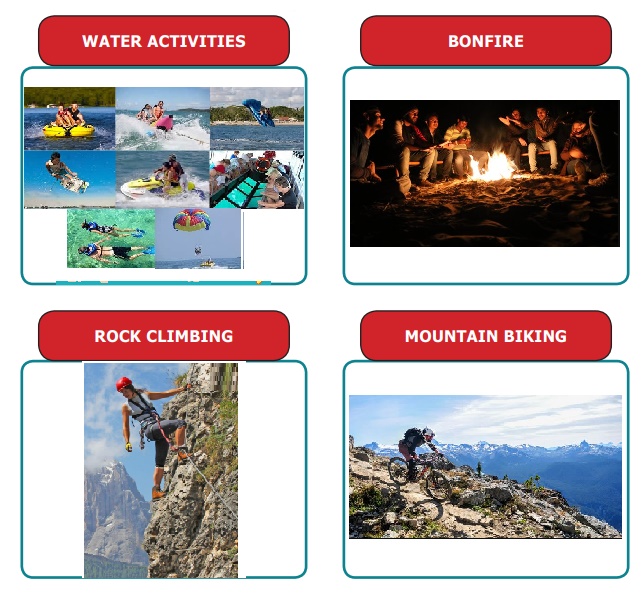
There is a very famous quote by Hellen Keller, “Life is either a daring adventure or nothing.” Adventure trips are all about making memories, gaining more knowledge, learning new things about the surroundings and about one’s own self and making lots of great stories. Going for an adventure camp is the best way to get all of these as it forces one to get out of their ordinary lives and try new things.
Adventure camp basically means spending the nights in tents and doing various activities at the camp-site. There are many activities included in camping to make it more exciting and interesting. Some of these are mentioned below:
Water Activities: If your camp site is near a water body then one can do aqua zorbing, water skiing, fishing, swimming, playing water volleyball and other such fun games.
Bonfire: This can be done during winter camping. Campers are made to sit surrounding the bonfire and talk about their stories or perform some acts, such as playing some instrument or singing songs.
Rock Climbing: This activity is meant to provide both physical and mental challenges to the climbers and help them in learning new skills.
Mountain biking: Just a few scratches and the trip can be memorable with new experience of driving bicycles on forest roads.
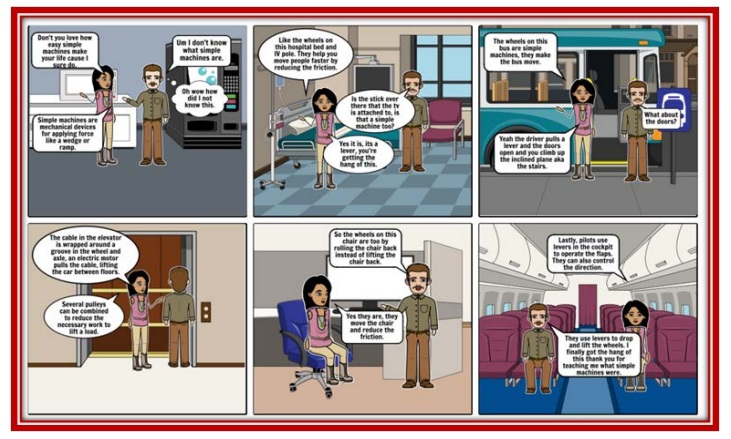
Don’t you love how easy sim-ple machines make your life cause i sure do.
Um I don’t know what simple machines are.
Simple machines are mechanical devices for applying force like a wedge or ramp.
On wow how did i not know this.
The cable in the elevator is wrapped around a groove in the wheel and axle, an electic motor pulls the cable, lifting the car between floors.
Several pulleys can be com-bined to reduce the necessary work to lift a load.
Like the wheels on this hospi-tal bed and IV pole. They help you move people faster by reducing the friction.
Is the stick over there that the tv is attached to, is that a simple machine too?
Yes it is, its a lever, you’re get-ting the hang of this.
So the wheels on this chair are too by rolling the chair back instead of lifting the chair back.
Yes they are, they move the chair and reduce the friction.
The wheels on this bus are simple machines, they make the bus move.
What about the doors? Yeah the driver pulls a lever and the doors open and you climb up the inclined plane aka the stairs.
Lastly, pilots use levers in the cockpit to operate the flaps. They can also shoppingmode control the directin.
They use levers to drop an-dlift the wheels. I finally got the hang of this thank you for teaching me what simple machines were.
Speaking
E. Look at the story board. Read the description of the simple machines. Take roles to play. Then discuss in pairs to describe any simple machine. Create your own story board and take roles to play.
Simple Machines
Prakash : Grandma! What are you doing?
Grandma : I’m drawing water from the well.
Prakash : Don’t you have a water tank or tap?
Grandma : No, my child. Ours is a very small village. It is isolated from towns.
Prakash : How do you get water for drinking and cooking?
Grandma : We draw water from this well.
Prakash : Grandma! What is this wheel? What is it for?
Grandma : It’s called a pulley. It has a groove. A rope passes along the groove.
Prakash : Should you use a pulley to draw water?
Grandma : Of course. The pulley is a simple machine. It makes my work easy. Have you studied about it in your science class?
Prakash : Yes, grandma. The scissors, lemon crusher, crowbar, the forceps etc are all simple machines.
Grandma : Well said, Prakash! You’re an intelligent chap.
F. Ask the students to tell a story. It may be a true story or an imaginative story. Choose one of the titles from the following.
* A time I was very late
* A funny story about my friend
* I met someone very interesting
* An unusual event
* A funny story about my life
A time I was very late
It happened last Friday morning. I was at the bus stop waiting for the bus. A little girl was also standing there. All of a sudden a motorbike hit her down and sped away. The girl fell to the ground. She was bleeding. I lifted the girl. I summoned an autorickshaw and took the girl to the nearest hospital. The doctors gave her first aid and they informed her parents about the accident. The parents of the girl came soon. They were tearful. They thanked me for my timely help. I went to school late that morning. The teacher did not rebuke me for my late-coming. He praised me for the help I rendered.
Think about your story
* When did it happen?
It happened last Friday morning.
* Where were you?
I was at the bus stop.
* Who was there?
A little girl was there.
* What happened?
A motorbike hit the girl down. I took the girl to hospital and saved her life.
Grammar
PICTO GRAMMAR
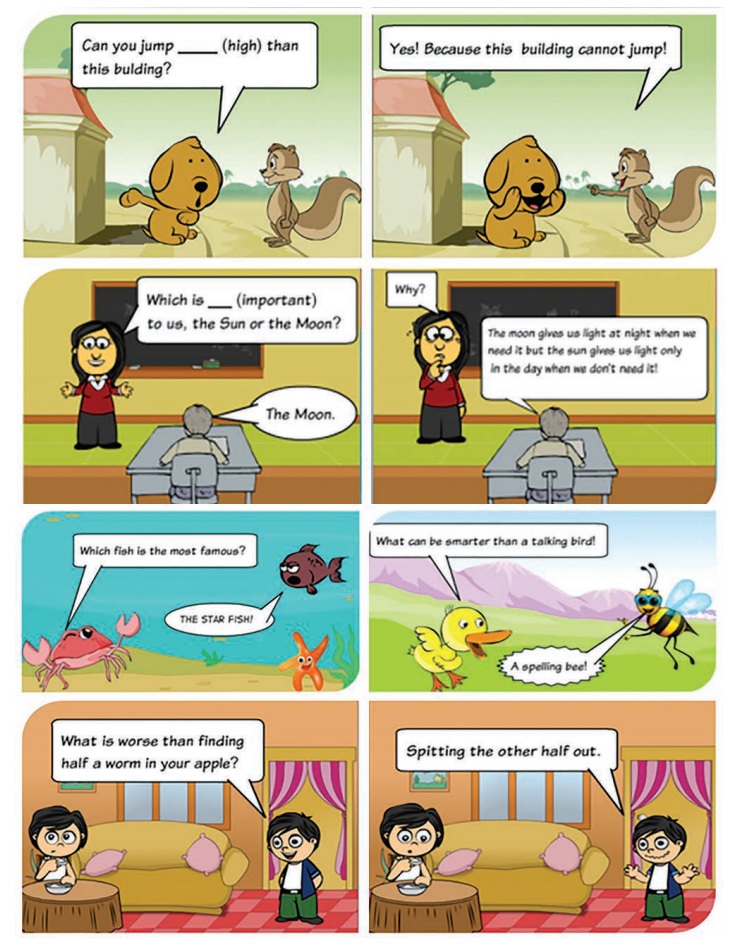
Can you jump higher (high) than this building?
Yes! Because this building cannot jump!.
Which is more important (important) tp us, the sun or the Moon?
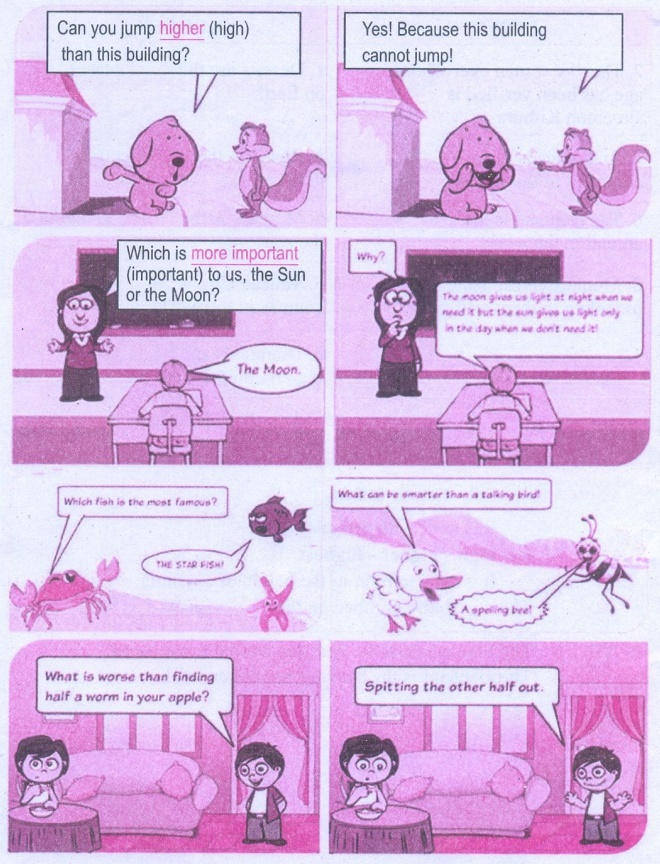
USE GRAMMAR
Solve the crossword puzzle using superlative adjectives.
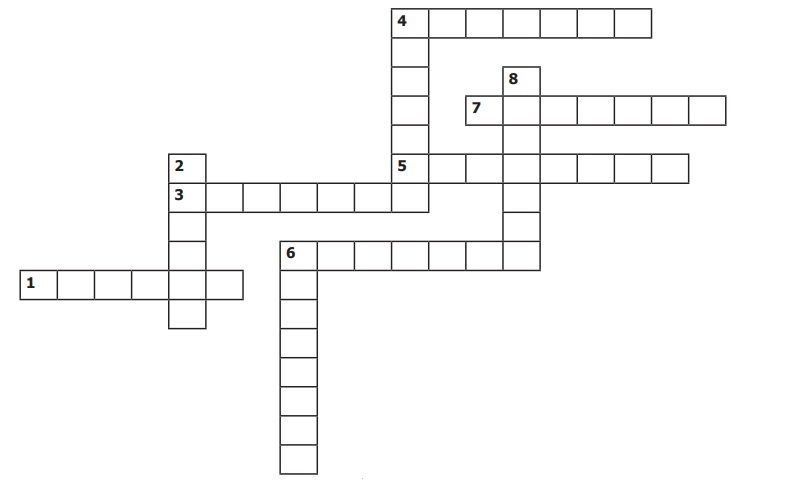
Down
2. The oldest man ever whose age has been verified is Jiroemon Kimura.
4. Antarctica is the coldest continent in the world
6. The elephant is the heaviest animal in the world
8. Mount Everest is the tallest mountain in the world world
Across
1. Deserts are the driest places on Earth
3. Russia is the largest country in the world
4. Mercury is the closest planet to the sun
5. Vatican City is the smallest country in the world
6. Diamonds are the hardest material in the world
7. The cheetah is the fastest animal in the world
Note 1: i) tall – taller – tallest.
It is used with persons
ii) high – higher – highest.
It is used to refer to the height of anything.
E.g : The tallest boy climbed on the highest peak.
Note 2 : The blue whale is the heaviest animal in the world.
The elephant is the heaviest animal on land.
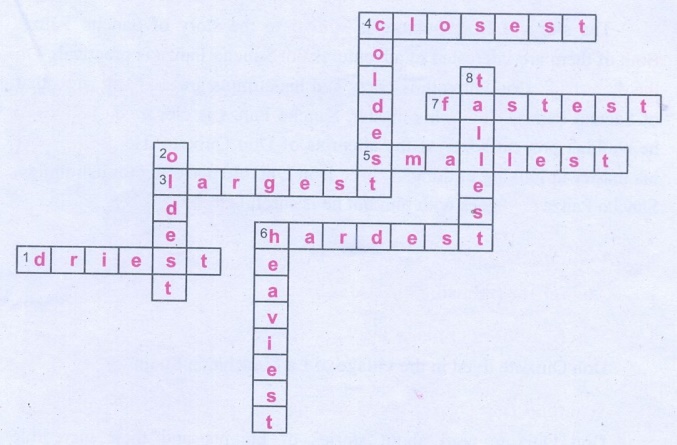
Put students in pairs and tell them to interview their partner. To do this they must make questions, e.g. What’s the worst storm you’ve ever seen? They can also ask follow-up questions to find out more information. Do feedback on this as a whole class. Other thematic questionnaires of this kind could be:
Emotional experiences
• The most frightened I’ve ever been …
• The happiest moment I’ve ever had …
• The most nervous I’ve ever been …
Musical experiences
• The best song I’ve ever heard …
• The worst song I’ve ever heard …
• The longest time I’ve ever danced …
Places in your life
• The most dangerous place I’ve been in …
• The cheapest restaurant I’ve eaten in …
• The most boring town I’ve ever visited …
Creative and Creative Writing
WRITING
Write a paragraph comparing Don Quixote and Sancho Panza. The following words will help you to write a compare and contrast paragraph.
Similarities
is similar to
both
also
too
as well
Differences
on the other hand
however
But
in contrast to
differs from
while
unlike
The story of Don Quixote is similar to the story of Sancho Panza. Both of them are interested in adventures but Sancho Panza is practical. On the other hand Don Quixote is crazy and his attmpts are in contrast to that of Sancho Panza. Unlike his master, Sancho Panza is clever too. However he couldn’t prevent some of the attempts of Don Quixote. He differs from his master in looking at things. While Don Quixote performs foolish things, Sancho Panza also goes with him but he is careful as well.
I. Answer the following questions briefly.
1. Where did Don Quixote live?
Don Quixote lived in the village of La Mancha, in Spain.
2. What did Don Quixote read about?
Don Quixote read about stories of knights and their incredible adventures.
3. What did Don Quixote imagine himself to be? What did he do?
Don Quixote imagined himself to be a knight and went in search of adventures.
4. Who was Sancho Panaz? How was he useful to Don Quixote?
Sancho Panza was a peasant in the village of La Mancha. Don Quixote made him his squire.
5. What did Don Quixote promise to give Sancho Panza?
Don Quixote promised to reward Sancho Panza with an island if he served him faithfully and honestly.
6. What did Don Quixote and Sancho Panza see on the hill?
Don Quixote and Sancho Panza saw a large old windmill on the hill.
CREATIVE WRITING
Local Historians
* Ask students to collect stories about their town from older people.
* Ask them to find out how the streets were named.
* Are there any interesting people or legends to which the street names refer?
* Are there any local places in town about which people tell stories?
* Any haunted houses?
* Let students find out when the town was founded and by whom.
* Visit a local historical society to see old photographs or artefacts.
Let student create an original historical fiction:
Describe the town from the point of view of a fictitious citizen who might have lived in the town long ago. Include local issues of the time in the story. Write the story of the town from the fictionalized point of view of a resident who actually lived.
Project, Connecting to Self, Step to Success
CONNECTING TO SELF
Tackling the Issues
Ask the class to discuss solutions to an issue that plagues contemporary society at large or just your community—for example, homelessness, violence, environmental degradation, hunger.
Half the class should mention idealistic solutions to the chosen issue; the other half should mention only realistic approaches to solving the problem.
See if, in listening to both sides, someone can come up with a proposal that is both realistic and unconventional—an idea that hasn’t been tried yet.
PROJECT
Imagine you are a marketing executive for a company in a specific industry (toothpaste, soup, hair care products, automobiles, etc) and are developing a product with a brand name that refers to a character from the story.
For example: You want to sell bandages that have little pictures of Don Quixote on them. Your company’s name is Kure-All and you decide to call them “Kure-All Quixote Bandages”.
The slogan might be: “Had a tough day with windmills? When you take a fall, use Kure-All.”
You can use exciting words, a catchy new slogan, and a jingle, among other things, to promote sales of your item.
STEP TO SUCCESS
Look at the number pattern. Fill the blank in the middle of the series or end of the series.
1. SCD, TEF, UGH, ____, WKL
A. CMN
B. UJI
C. VIJ
D. IJT
There are two alphabetical series here. The first series is with the first letters only: STUVW. The second series involves the remaining letters: CD, EF, GH, IJ, KL.
2. FAG, GAF, HAI, IAH, ____
A. JAK
B. HAL
C. HAK
D. JAI
The middle letters are static, so concentrate on the first and third letters. The series involves an alphabetical order with a reversal of the letters. The first letters are in alphabetical order: F, G, H, I , J. The second and fourth segments are reversals of the first and third segments. The missing segment begins with a new letter.
3. ELFA, GLHA, ILJA, _____, MLNA
A. OLPA
B. KLMA
C. LLMA
D. KLLA
The second and forth letters in the series, L and A, are static. The first and third letters consist of an alphabetical order beginning with the letter E.
4. CMM, EOO, GQQ, _____, KUU
A. GRR
B. GSS
C. ISS
D. ITT
First letter of each term… C, E, G, (I), K…… Second letter of each term… M, O, Q, (S), U…… Third letter of each term… M, O, Q, (S), U…… Missing term is ISS…
5. QPO, NML, KJI, _____, EDC
A. HGF
B. CAB
C. JKL
D. GHI
Explanation…..First letters of terms are… Q, (Q-3)=N, (N-3)=K,, ((K-3)=H),, (H-3)=E…… Second letters of terms are… P, (P-3)=M, (M-3)=J,, ((J-3)=G),,(G-3)=D…… Third letters of terms are…O, (O-3)=L, (L-3)=I,,((I-3)=F),,(F-3)=C…… Using this, we get the missing term as HGF….( Tip.. you should learn numbering of alphabets to solve the questions easily and fastly..)














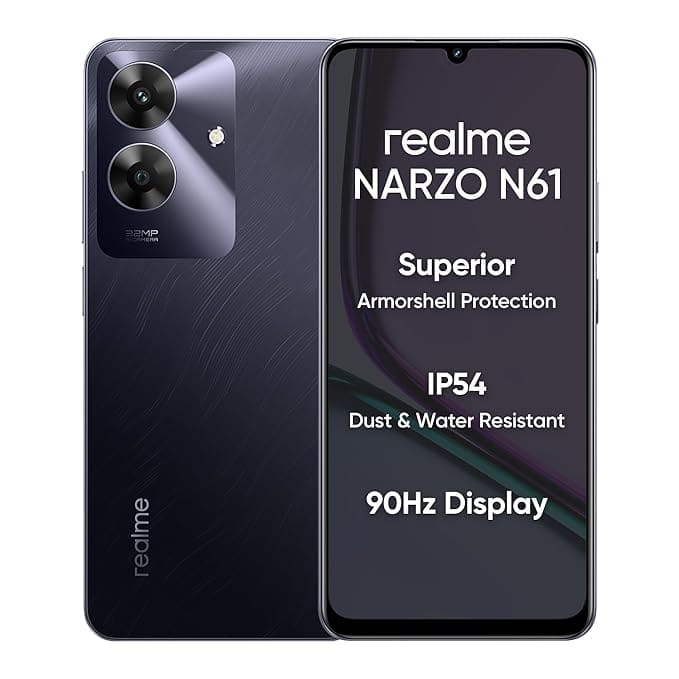
It is very useful to me
Where is the antonyms synonyms